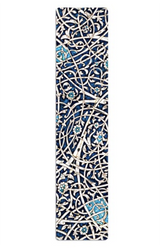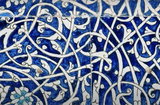BOOKMARK
- Size: 1.5"W x 7.25"H
- Double sided design
- Textured Printing
- Rounded Edges
- Original Art: Photograph by Gérard Degeorge
- Era: Contemporary photograph of historical architecture
- Region: Western Islamic world
Photographer Gérard Degeorge has travelled the world capturing grand pieces of architectural design through the scope of his lens. We have previously turned to his celebrated photography collection for our Islamic Tileworks, Jali Walls, Intricate Inlays and Taj Mahal Flowers journal covers, and return once more for this new design celebrating Western Islamic art.
This unique black and white pattern, speckled with pops of turquoise, represents one of the most magnificent forms of decorative art – that of Islamic tilework. Unlike many other religious artistic traditions, Islamic artists follow the concept of “aniconism,” meaning that the creation of living beings is only for God and should therefore be left out of the artwork they create. In lieu of human or animal figures, this style of art includes three key elements: floral motifs, geometric designs and calligraphy.
We first came across this small photograph while browsing Degeorge’s collection and were immediately transported back to visiting the Alhambra in Granada, Spain. A true highlight of Moorish architecture and a UNESCO World Heritage site, the Alhambra is adorned in tile mosaics set around a theme of “paradise on earth.” Though we cannot be certain where this exact photo is from, the geometric pattern, floral design and arabesque setting are all suggestive of the architectural styles of Islamic art found in Granada.
Through the centuries, Islamic inlay artists and architects have led the way in expressing faith through their craft. The art form that created our intricate and colourful Granada Turquoise design continues to amaze and inspire today. It is our hope that this journal design will transport you, as it did us, to a place of inspiration and amazement, and perhaps even inspire your own travels to the world of Western Islamic art.









